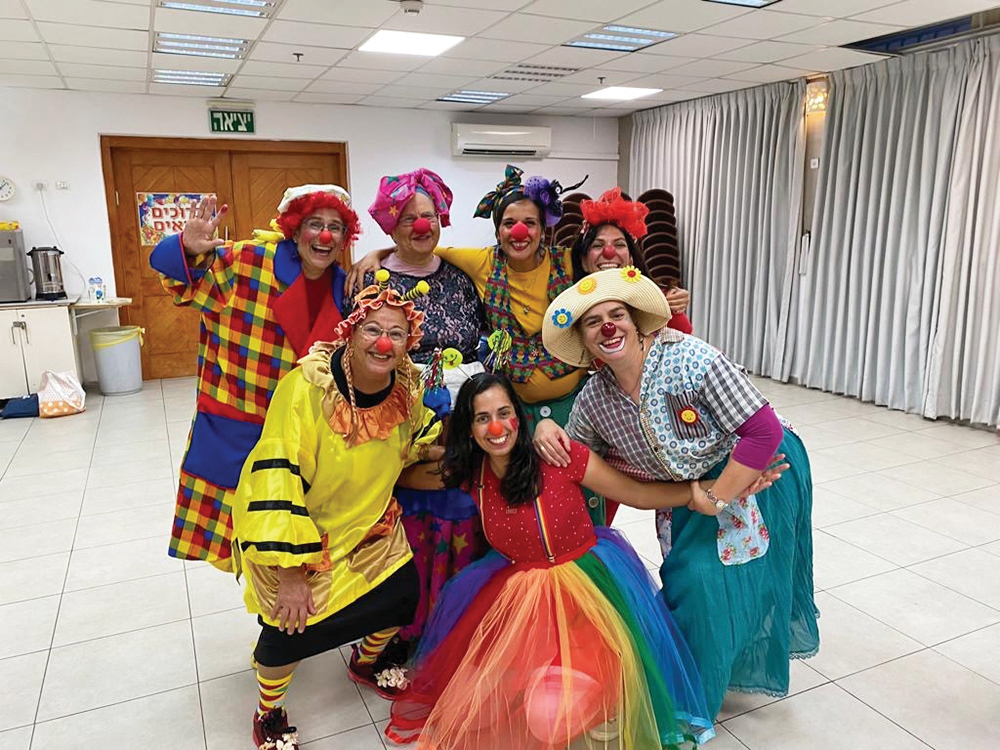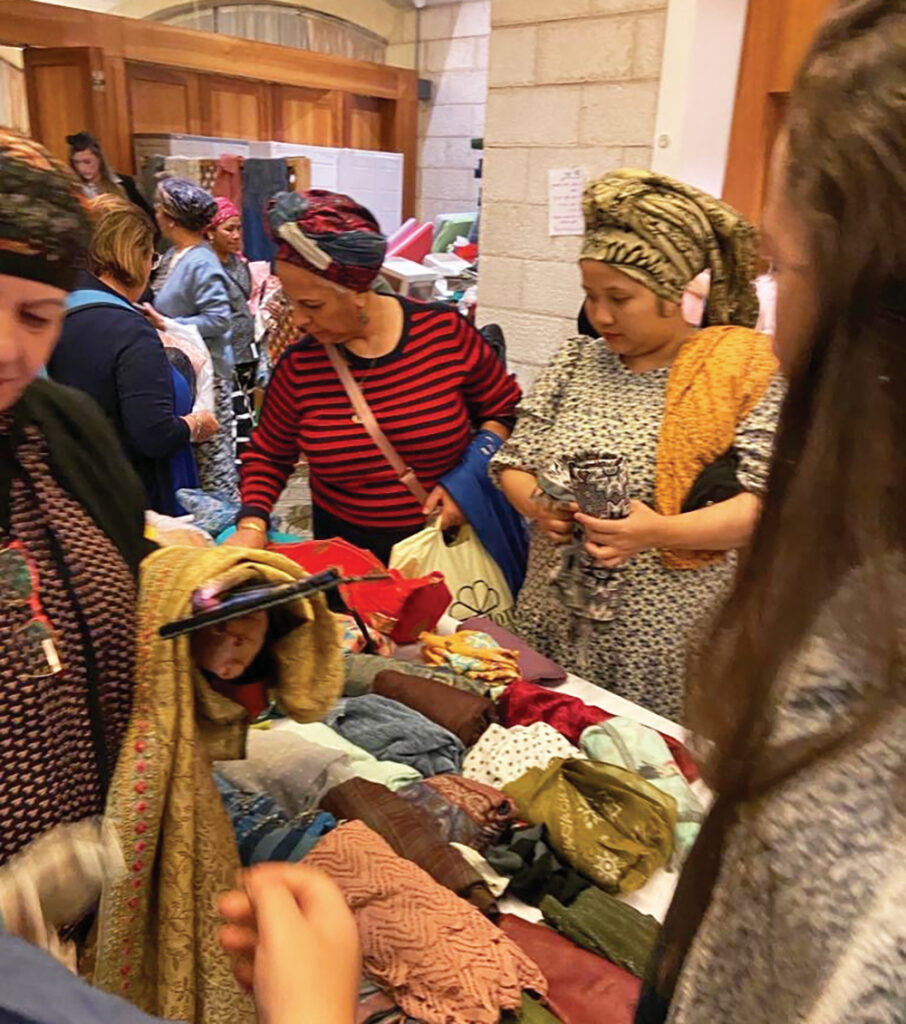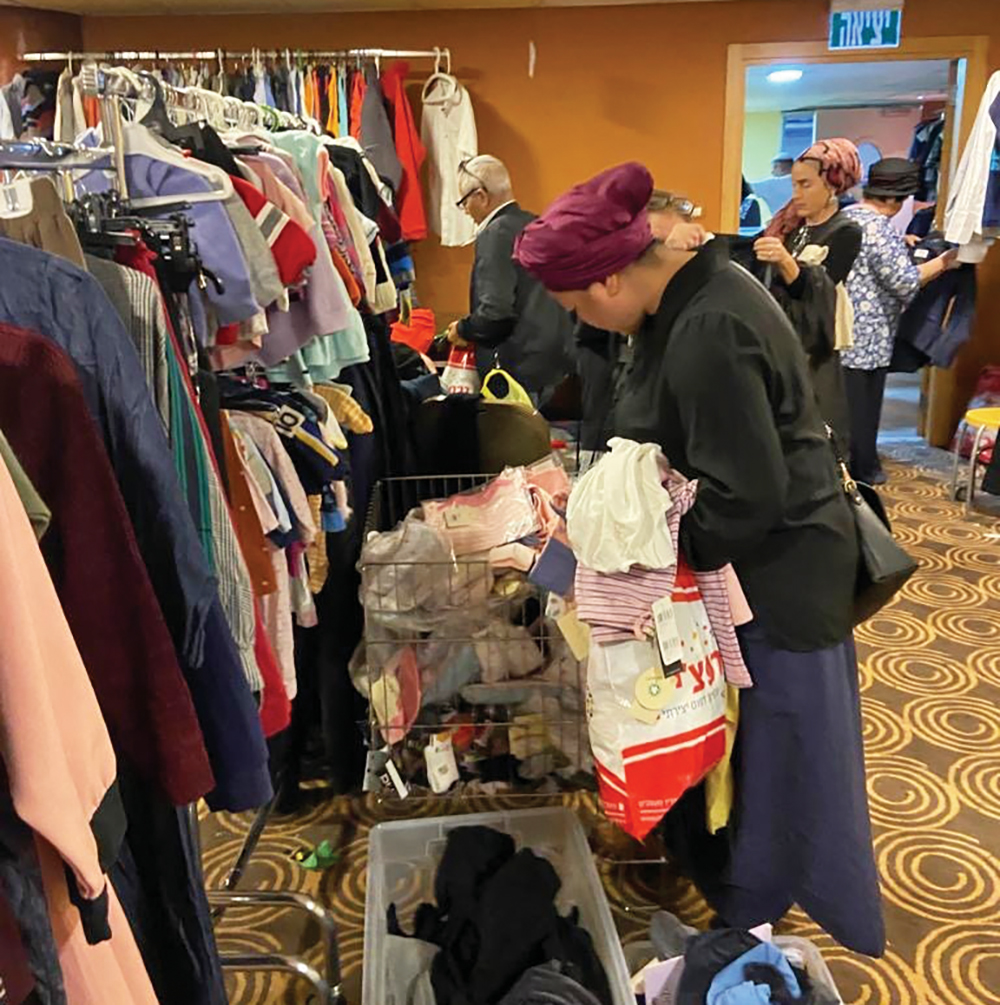
Channah Appel, a recent Oleh from Cleveland, did the intense six-month medical clowning course long before October 7 occurred. A part of the organization “Simchat HaLev,” the medical clowns would frequently visit those in hospitals, bringing joy and laughter to the patients, their families and the staff, but with the onset of the massacre, Channah and her teammates were needed elsewhere.
Immediately, they were sent to the hotels that housed displaced people to try to create moments of laughter in an extremely somber and painful environment. But after two months of regular visits, they learned that these interactions were reaffirming to the families that life was still very much abnormal. And so, they shifted back to hospital visits but also started to do birthday parties and other informal gatherings, and sometimes Channah just goes dressed as herself to the hotels for crafting with the kids.
Channah also had a long history with clothing gemachs, and she noticed that the 2,000 displaced people in the East Jerusalem hotels near her home had no access to clothing, nor did they have the means to buy anything. There was also the fact that most families still at home were in need of using their bomb shelter rooms, which had often become a warehouse to store each family’s old clothing, and suddenly, they needed to be cleared out. An idea was born to Channa: in the basement of the Olive Tree Hotel, she would start a clothing gemach for evacuees.
The clothing poured in. Because so much of it was outdated, many years of sitting in storage boxes rendering them worn out or out of style, a lot had to be discarded. There was so much coming in that the pile of clothing that could not be used was up to the ceiling in the parking garage. Store owners from New York and New Jersey were sending hundreds of duffel bags full of donations containing winter coats, Shabbat clothing, shoes and sweaters—all new with tags, creating a respectable shopping-like experience for the evacuees.

The displaced people were from different socioeconomic backgrounds; many had not seen so much clothing before as they live simple lives. Volunteers poured in to help build racks, organize the shelves, and run the operation. Eventually, it was decided that they would charge one to three shekels per item as people were just taking armloads of items and tossing what didn’t fit; the nominal pricing made the buyers a little more discerning.
By the end of December, before she flew home for her son’s wedding, Channah noticed people were not coming so much anymore as they had a need to venture out of the hotel and explore elsewhere. And so the former gemach in the basement of the Olive Tree Hotel was turned into a youth lounge, complete with gaming systems and activities.The clothing gemach was moved to a house that was donated for the purpose, in Givat Hamivtar, and some clothing was shipped out to other gemachim. Channah notes the importance in staying fluid with the needs of the evacuees, and filling the requests as they arise. The flexibility and ability to continue with the movement, to not take things personally as your investments in projects soar and then dip, is crucial to successfully helping those seeking assistance.
For Channah, her days are filled with volunteer efforts, being stretched between the world of the clothing gemach, the art projects, mitzvah clowning and the setting up and running of the youth lounge. Yet a good portion of the space in her emotions belongs to the well being of her family, specifically to her own sick child. But she says that dedicating her time to the service of others lessens the amount of worry she has, as it becomes a meaningful distraction to her own difficulties. As a mother, Channah also feels connected to other children, even those who aren’t her own, and their trauma becomes her trauma.
There was a time when she went to the Jerusalem Theater Hotel with six other clowns to work with the evacuees, and she noticed that there were several babies in their strollers who seemed to be staring aimlessly into space. The clowns were able to connect with some of the older children, but the babies seemed unreachable. No matter which trick they tried, they couldn’t elicit any kind of reaction from the babies, and Channah felt something was amiss. Later, after having a discussion with a friend who is a psychiatrist, she learned that the babies were conditioned to sit silently, as they had spent time in hiding or in shelter rooms when things were extremely perilous, being forced into silence lest they get discovered and kidnapped or killed. Their trauma response to this became a learned mutism that would slowly need to be coaxed undone, the accumulated pain in their short lives, being meticulously unraveled.

Channah understood that being a grounding presence, not only for the babies, but for anyone who had suffered and carried their wounds on their bodies and in their hearts, would provide a deep, nurturing healing that only a human-to-human bond could create. One day at a time, one act of clowning, one beautiful dress lovingly adorned on a broken body, one smile, authentic and light, spreading across supple cheeks, bringing happiness to their hearts, “Simchat Halev.”
Anyone who wants to be in touch to sponsor art supplies for kids or teens, or women’s mental health nights (making jewelry and belly dancing, amongst other therapeutic activities), or might have room in a suitcase to bring over such donations, please be in touch with Channah via Whatsapp, at +972-50-671-6943. She has ideas for every budget!
Sarah Abenaim is a writer, life-coach and journaling workshop curator who lives with her husband and kids. To be featured in one of her stories, please reach out to her at [email protected], or to David Siegel at [email protected]. To learn more about how you can make an impact in the war effort, check out https://tinyurl.com/Rinat-VolunteeringinIsrael.












